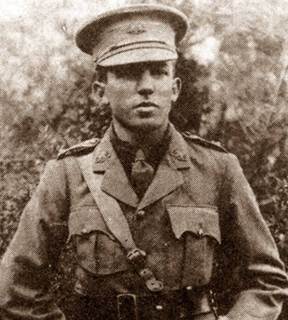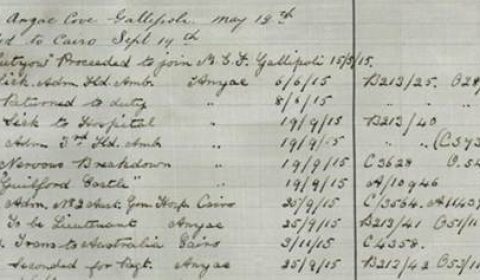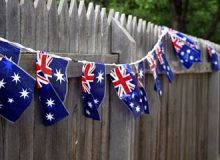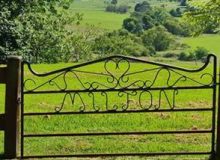The writings of an Anzac: Rupert Frederick Cork
Rupert Frederick Cork was born 3 Dec 1892 at Buckeboura, he was the son of Frederick William Cork and his wife Rhona nee Simmons. Growing on the Cork family’s Hilltop Farm at Milton. He joined the local Milton Light Horse squadron in Apr 1912 and promoted to 2nd Lieutenant in Oct 1912 and Lieutenant in Mar 1913. Rupert was also a farmer at the Hilltop Farm at Milton.
Rupert’s name appears on many of the local honour rolls including the RSL Honour Roll, Milton Town Memorial, Milton Primary School, Milton Methodist and the Milton Methodist WW1 Flag. His brothers Frank Richmond Cork and Albert Stanley Cork also served in WW1.
After his enlistment on 4 Nov 1914, at the age of 22 years, Rupert was appointed the 6th Light Horse Regiment, 3rd Reinforcement. In Jan 1915, Military orders notify the appointment of Lieut. R. F. Cork to the Australian Imperial Force. Lieut. Cork is a son of Mr. Fred Cork (of Milton), the well-known rifle shot. In Feb 1915 after a few months in Camp in Sydney, he returned home to say goodbye to family and friends, before he travelled to Cairo Egypt. On 15 May 1915 he joined MEF (Mediterranean Expeditionary Force) at Gallipoli.
Before leaving for Gallipoli he wrote a letter to home dated 8 May 1915. This letter was published by many regional newspapers across NSW titled “Bullets in Pyjama Pockets”: No doubt the residents of Milton are wondering how the local boys are getting on in Egypt. Well, I have only seen two of them, Norman Davis, and Jack Buchan. Norman has been to see men a few times. He looks well and is a champion soldier. I would like to have command of a troop like him. I would fear nothing then. Jack Buchan is camped only ten yards from my tent, so I often see him; he is in the A.S.C. … I have command of B troop, A squadron and a grand lot of lads they are too. They would go through fire I believe. I am quite satisfied to lead them anywhere and I know everyone can be depended on. I suppose that the news of the Australian lads at the Dardanelles has been published in the Sydney papers.
Nothing has been in print here about it. All the news we get is from the wounded. Not a few words about the wounded. They are all brought back here. I have been to the Heliopolis hospital to see them. A grand feature about the carriage of wounded from Alexandria to Cairo is the beautiful trains. These are run off the train lines on to the tram lines and therefore the trains run right up to the hospital door. The Heliopolis hospital is a large hotel which cost six million pounds to build and has been converted into a hospital. It is one of the most beautiful buildings in the world, has 1800 large rooms. I think they could take in about 6000 wounded. The first sight that met our eyes was that the footpath in front of the hospital was covered with splashes of blood.
On entering the hospital I found wounded lying all over the place, but all were cheerful and bearing their suffering well. The worst cases were left at Alexandria.
The patients here were those who could not get up, those who were able to walk were in the Luna Park, which is a large amusement park similar to the White City. This has been commandeered for a hospital. Also, I hear that two of the small theatres are snapped for hospitals, other hospital in Cairo is full. I went round and chatted to the wounded, who, as I said, were all cheerful.
They delighted in pulling out of their pyjama pockets bullets which had been extracted: I notice that the Turkish bullet is sharpened at the point like a pencil. The men were wounded in different parts of their bodies from head to foot, but I never saw one with a bayonet wound, which shows that the Turks were frightened to use them. Our lads say that theirs was all bayonet work, and nearly every Turk killed was bayoneted in the back. Our lads were mostly wounded and killed while landing. The work done was the greatest and bravest feat ever performed in warfare. The Charge of the Light Brigade was nothing to it. Though our losses were heavy the gain made up for it.
The treachery and cruelty of the Turks is too horrible to mention, I might say that there will be no surrender for any of our regiment when we go; nor will we take any prisoners. I am going to discard my sword and revolver, dress the same as the men and carry rifle and bayonet. Most of the officers, I think, will do the same, as we will be too easily picked off otherwise. We are moving off in a few days, going infantry, as there is no place for horses in the Dardanelles (too much rock). When country allows it, the horses will follow. A peculiar thing is that every man carries some firewood on his back; none obtainable there. Well, I might mention that we are all anxious to get there to assist the other lads who have done so well.
Coming back to the hospital again, I might mention that the doctors and nurses are working in a way that deserves great credit, as there is a frightful lot to attend to. The cry is for more doctors.
Kind regards to all at Milton, can assure no matter what happens the local lads here, they may rest assured that we did our duty first. In a foot note, Lieut. Cork says he cannot understand how people can write home and say things are cheap in Egypt. His experience is that everything is dear except washing and eggs. He has failed to find the decent meals at 4d, and has had to pay 4s for a proper meal. Cigarettes at 20 for 2½d is an unheard of thing except those which may be had from natives, who pick up bumpers in the street and make cigarettes out of them. Anything that is bought for little money is dear because it is rubbish.
At the end of May he was knocked out by high explosive shell, unconscious for an hour and afterwards suffered with tremors and headache. He resumed duty although nervous and tremors. The continuous shelling and strain then broke him down completely. Rupert had served at Gallipoli from 20 May 1915 to 19 Sep 1915. In June 1915, the Times newspaper reported that Lieut. Rupert Cork had report from Cairo Egypt that he had met up with Jack Buchan, who was driving an army service wagon, and in the wagon team he recognised a horse formerly in use on Mr. Frederick William Cork’s farm at Woodburn.
Rupert was admitted to No. 2 General Hospital at Cairo on 25 Sep 1915 after his breakdown and now one stone below weight. He improved slowly but his memory not good and he tired very quickly. He was invalided to Australia in November 1915, discharged and granted a pension. On returning home to Milton in Jan 1916, Rupert was presented with a gold Albert by the members of the local squadron A.L. H. Rupert then became involved with both local and South Coast war recruitment and war effort with the Red Cross.
In Apr 1916, he was appointed the enrolling officer for the Northern Districted with headquarters at Armidale and eventually worked at the Sydney Show Camp, followed by being the War Recruiting officer for Eden and other locations on the South Coast. Rupert was appointed a Justice of the peace in Jul 1917. Rupert established himself as a Auctioneer and Commission agent at Milton on 1 January 1918 and pointed out his war service ‘Late of 6th Light Horse, AIF” when advertising the business.

Rupert Frederick Cork married Clare Stone at a military wedding on 23 Mar 1918 at Hurstville Sydney, with Rupert’s sister Hazel being one of the bridesmaids. Frank Cork, Rupert brother was one of the groomsmen. The newlyweds made Milton their new home. A daughter was born to them in 1922, however they were divorced in 1928 when Clare Louisa Gertrude Cork (formerly Stone) sued for a divorce from Rupert Frederick Cork, on the ground of desertion. Clare had already moved back to Hurstville whilst Rupert stayed home at Milton, he was still an Auctioneer and Commission Agent in 1937 at Milton, living at Hilltop Milton.
Rupert moved to Sydney in the 1940 when he enlisted into WW2 service which he served for five years. He died in 1959 at Balmain and is buried at the AIF Crematorium, Rookwood Cemetery Sydney NSW.
Image of Rupert Frederick Cork from authors collection
Milton Ulladulla Anzacs © Cathy Dunn: Ulladulla.Info






